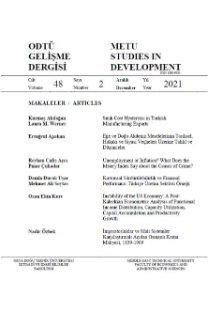Milli gelir, yurtiçi hasıla ve dış ticaret hadleri üzerine bir inceleme
Bu çalışma, dış ticaret hadlerinde gözlenen değişimlerin reel gelir üzerindeki etkilerini Türkiye ekonomisi için incelemektedir. Gayri Safi Yurtiçi Gelir (GSYG), dış ticaret hadlerindeki değişmeyle ülkelerin satın alma güçlerinde meydana gelen değişmeleri, Gayri Safı Yurtiçi Hasıla'nın (GSYH) aksine dikkate almaktadır. 1998-2010 döneminde, dış ticaret hadleri gerilerken, sabit fiyatlarla GSYH ve GSYG birbirine yakın oranlarda artmıştır. Reel GSYH'nin, yurtiçi geliri, dış ticaret hadlerindeki bozulma nedeniyle yüksek tahmin ettiği görülmektedir. Bir muhasebe yöntemi kullanılarak reel GSYG'nin yıllık büyüme oranı reel GSYH büyümesi, dış ticaret dengesi ve dış ticaret hadleri etkisi olmak üzere ayrıştırılmıştır. GSYH güncelleme çalışmaları kapsamında 1987 ve 1998 bazlı GSYH serileri arasındaki farklılıklar dikkate alınarak 1987 bazlı verilerin yayımlandığı 1987-2006 dönemi için reel gelir hesaplamaları tekrar edilmiş ve her iki serinin yayımlandığı 1998-2006 dönemi için sonuçlar karşılaştırılmıştır. 1998 bazlı GSYH serisinin ima ettiği milli geliri, 1987 bazlı seriye göre daha iyi tahmin ettiği gösterilmiştir.
A study on real income, GDP, and terms of trade
This study analyzes the effects of terms of trade fluctuations on real income for Turkey. Gross Domestic Income (GDI), opposed to Gross Domestic Product (GDP), takes into account the changes in purchasing power of countries due to the changes in terms of trade. In the period of 1998-2010, real GDP and real GDI grow at close rates while terms of trade declines. Hence, real GDP overestimates domestic income due to deterioration in terms of trade. Using an accounting framework, annual growth rate of real GDI is disaggregated into three factors: real GDP growth, trade balance and terms of trade. Differences between 1987 and 1998 based GDP series are taken into account to capture the effect of official GDP revisions. Real income calculations are repeated using 1987 based series between 1987 and 2006 and the results are compared with the findings of the 1998-2006 era. Our results suggest that 1998 based series estimates corresponding real income better than 1987 based series does.
___
- Aslan, n. ve yörük, D. (2008), "Teoride ve Uygulamada Dış Ticaret Hadleri ve Kalkınma İlişkisi", Marmara Üniversitesi İ. İ. B. F. Dergisi, 25(2): 33-69.
- Bureau of Economic Analysis (2006), "A Guide to the National Income and Product Accounts of the United States", http://www.bea.gov/national/pdf/nipaguid.pdf
- Demiroğlu, U. (2011), "Türkiye'nin Son Krizlerinde Sabit Sermaye Büyümesi Kayıpları ve Bu Kayıpların Potansiyel GSYH Etkisi", Yayımlanmamış Çalışma, TCMB.
- Gökalp, M. F. (2000), "Liberilizasyon Sürecinde Türkiye'de Dış Ticaret Hadleri Trendi ve Dış Ticaret Hadlerindeki Değişmelerin Gelir Etkisi", D. E. Ü. İ. î. B. F. Dergisi, 15(1): 49-65.
- GÜNÇAVDI, Ö., KÜÇÜKÇIFÇI, S. ve ÜNGÖR, M. (2008), "Cari Açıklar ve Türkiye Ekonomisinin Artan Döviz İhtiyacı", Uluslararası Ekonomi ve Dış Ticaret Politikaları, 3(1-2): 57-84.
- Hepaktan, E. (2007), "Türkiye'nin Dış Ticaretinin Gelir Yönlü Analizi", Uluslararası Ekonomi ve Dış Ticaret Politikaları, 1(2): 79-112.
- İŞCAN, T. (2012), "Changes in the Terms of Trade and Sectoral Reallocation of Labor: The Case of Guyana, Jamaica, and Trinidad and Tobago", Open Economies Review, 23(3): 473-500.
- Kehoe, T. J., and Prescott. E. C. (2002), "Great Depressions of the 20th Century", Review of Economic Dynamics, 5(1): 1-18.
- Kehoe, T. J, and Ruhl, K. J. (2005), "Is Switzerland in a Great Depression?", Review of Economic Dynamics, 8(3): 759-775.
- Kehoe, T. J,(2008), "Are Shocks to the Terms of Trade Shocks to Productivity?", Review of Economic Dynamics, 11(4): 804-819.
- Kehoe, T. J,(2010), "Why Have Economic Reforms in Mexico Not Generated Growth?" Journal of Economic Literature, 48(4): 1005-1027.
- Kohli, U. (2004), "Real GDP, Real Domestic Income, and Terms-of-Trade Changes", Journal of International Economics, 62(1): 83-106.
- Mendoza, E. G. (1991), "Real Business Cycles in a Small Open Economy", American Economic Review, 81(4): 797-818.
- Mendoza, E. G.(1995), "The Terms of Trade, the Real Exchange Rate, and Economic Fluctuations", International Economic Review, 36(1): 101-137.
- Ohanian, L. E. (2010), "Accounting for the Great Recession: Why and How Did the 2007-09 U.S. Recession Differ from All Others?" Federal Reserve Bank of Minneapolis Research Economic Policy Paper 11-1.
- Reinsdorf, M. B. (2010), "Terms of Trade Effects: Theory and Measurement", Review of Income and Wealth, 56(sl): Sİ 17-S205.
- T.C. kalkınma bakanlığı (2011), "Katılım Öncesi Ekonomik Program: 2011-2013", Ankara: Ocak 2011.
- Tokdemir, E. (1984), "Dış Ticaret Hadleri", istanbul Üniversitesi İktisat Fakültesi Mecmuası, 38(3-4): 67-83.
- United Nations (1993), "System of National Accounts 1993", http://unstats.un.Org/unsd/nationalaccount/docs/1993sna.p
- ISSN: 1010-9935
- Yayın Aralığı: Yılda 3 Sayı
- Başlangıç: 2018
- Yayıncı: ODTÜ İİBF
